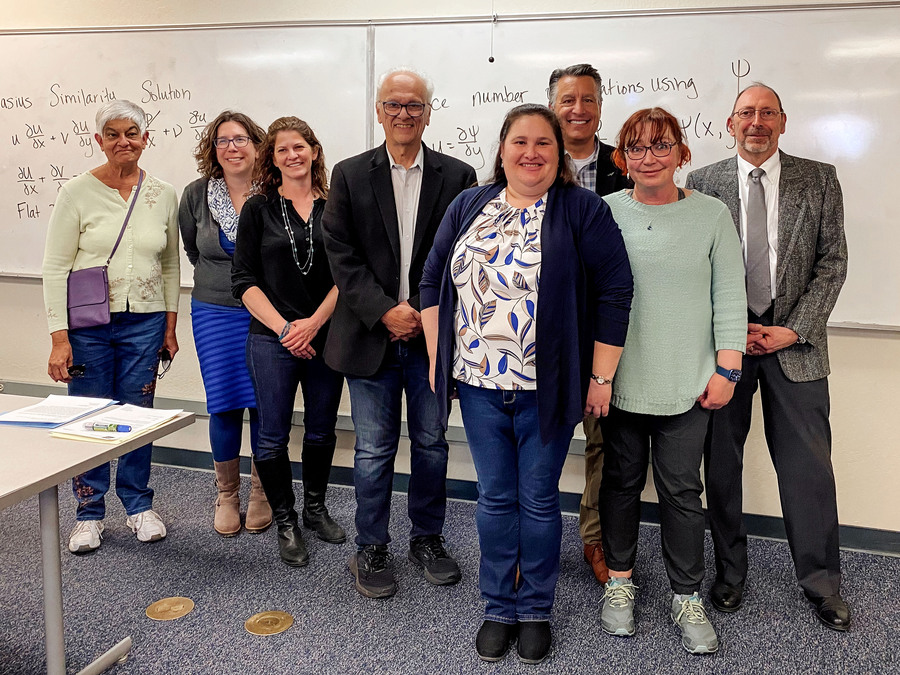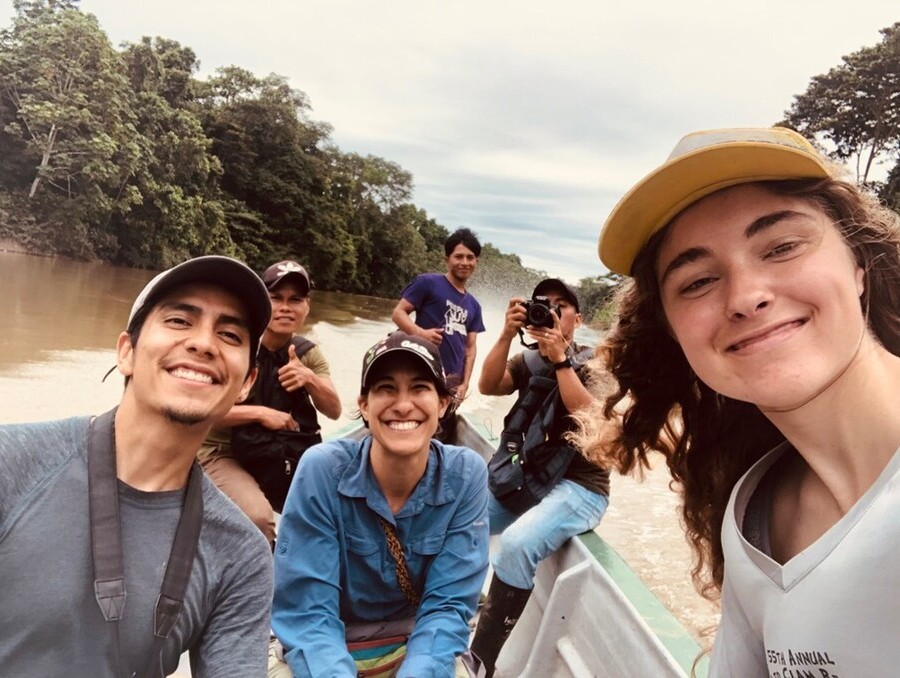Sometimes when you win an award, you are not only in the moment, but you are taken back in time as well.
That was what happened last month when Angelina Padilla, teaching assistant professor in the Department of Mechanical Engineering in the College of Engineering, was presented with the F. Donald Tibbitts Distinguished Teacher Award.
Members of the Tibbitts selection committee, Dean Manos Maragakis, University President Brian Sandoval and several other of Padilla’s College of Engineering colleagues were on hand to present the award to Padilla. The presentation was a surprise, and it came during Padilla’s Mechanical Engineering 467, Intermediate Fluid Mechanics, class.
In presenting Padilla with the award, Maragakis, who is retiring as dean of the College of Engineering at the end of the semester, recalled how time has flown since Padilla began her career at the University.
Padilla was a freshly minted Ph.D. from Stanford University when she interviewed at the University in 2012. She has been on faculty here ever since.
“Yes, it feels like yesterday when were interviewing Angelina for this job,” Maragakis said. “She has done such a masterful job. She has done so many things for the department, and she has played such a critical role in achieving our goals.”
Said Padilla: “Time flies when you are busy and enjoy what you do. When I first started, I was fresh out of my Ph.D. and had never taught a class completely on my own. I have evolved a lot since I first started. I have always believed in having clear expectations and engaging students in the classroom but I am a lot more effective than when I started.”
What is so effective about Padilla’s teaching, said Sarah Cummings, director of Advancements in Teaching Excellence and also a past Tibbitts recipient herself, is how Padilla is able to connect her subject matter to the real world.
“Angelina designs her courses to effectively guide students through activities that develop skills in complex problem solving,” Cummings said. “Students are challenged to develop methodologies in approaching complex problems and in using critical thinking to question if solutions make sense. Angelina creates relevancy by connecting problems to real-world contexts.
“She creates multiple ways for students to engage with content and multiple ways to demonstrate learning, encouraging students to approach problems from varied perspectives. Her expectations and explanations are organized and clear.”
Cummings added that Padilla’s teaching style and interpersonal relationships couldn’t be more welcoming and effective: “Her calm and confident presence, respectful interactions with students, and deliberate inclusion of collaborative activities create a welcoming, empowering, and positive learning environment. She is a respected colleague and advisor who is the go-to for questions about curriculum and advising in the Mechanical Engineering Department.”
For her part, Padilla said she has always wanted to teach.
“I was good at math and engineering seemed like a good fit,” she said. “As a Hispanic female and a scholarship recipient, I felt strongly that I should go as far as I could in my education. I enjoy teaching and the mechanical engineering department at UNR has good people and I felt I could really contribute on multiple levels.”
Her teaching philosophy centers on guiding her students to “solve problems they will be asked to solve by the end of their career and probably have not been thought of yet.” One of her techniques is a solution process where Padilla often asks her students to walk her through the solution to examples.
“Having the students tell me what equations to use and what the next steps need to be reinforces how to approach a problem they are unfamiliar with. I also try to be as clear as possible,” she said. “I tell the students the material I want them to know and then assess them on it. The material is hard, so I try to make the expectations clear.”
When Padilla was presented with her award in front of her students, one of the things she mentioned was that she is always hoping her students will “learn something” and that they would “be happy about it.” She said later that she thought it important to link learning with the idea that learning can be something that is enjoyable, and worthwhile.
“I always found for myself that I was happy when I learned something, it stayed with me, and ultimately I was able to use sometime in the future when I needed it,” she explained. “So when I said I hope they will be happy about it, the wish was long-term. I can only help with the first part (helping them learn) and to some degree the second part if I sufficiently reinforce the material.
“The third part, I have very little control over since I don’t know what they will need in the future, but I try to teach them material and skills that will hopefully be useful at some point in the future. Until that happens, I try to make the learning process as enjoyable as possible by being fair, honest, and personable with the students.”
And, if there are any takeaways that Padilla hopes that her students carry with them once they’ve completed one of her courses, it’s the idea that through mastery of content they can also build confidence in who they are, and what their capabilities might be.
“I want my students to feel like they learned a lot and there was value in what they learned,” she said. “I want students to possess the confidence in the skills they learned to look at a problem and say I know how to approach this problem to get a solution.
“I am fairly confident that I succeed with the first takeaway. The second probably varies with the student but hopefully all of them take at least a few steps in that direction.”
















